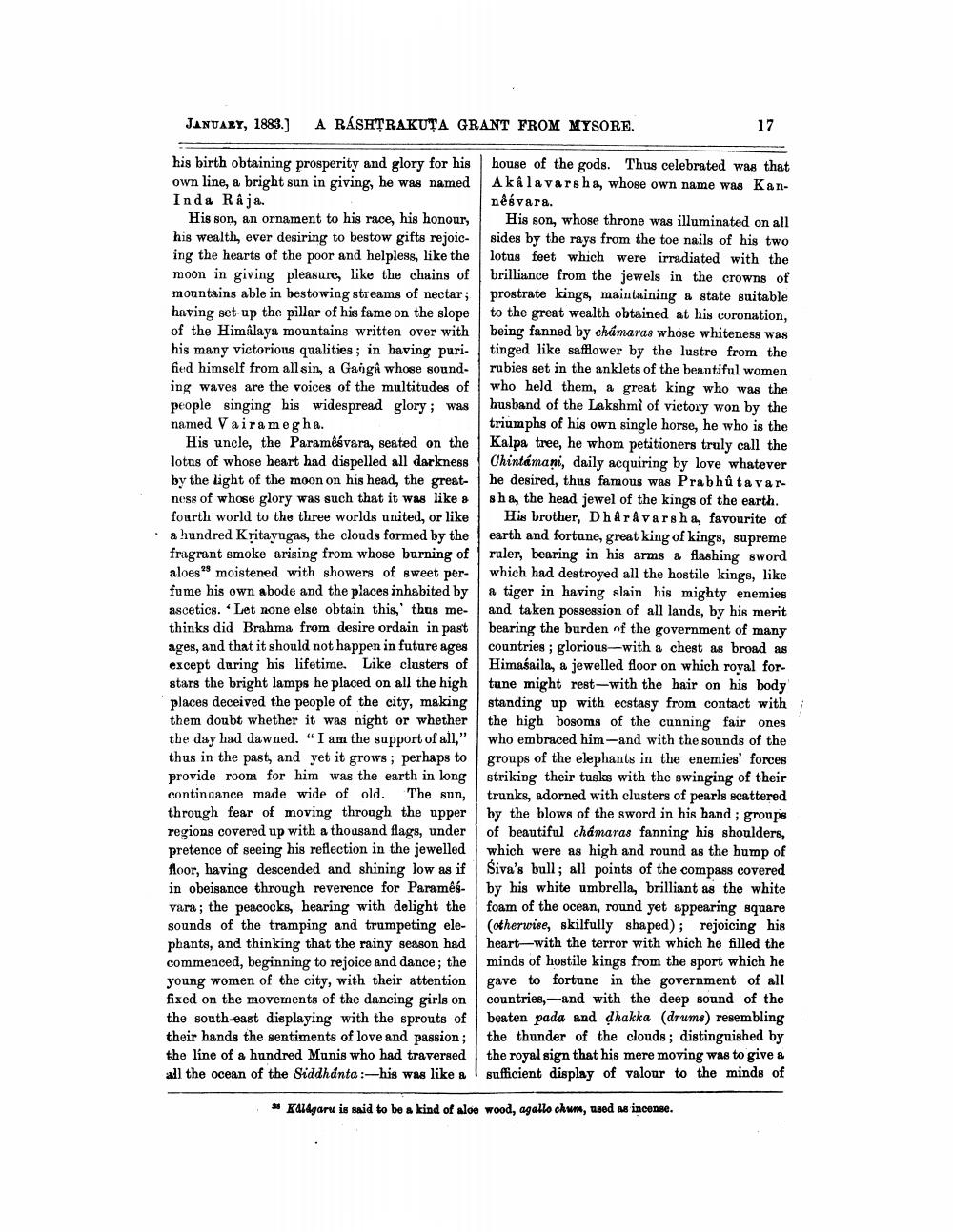________________
JANUARY, 1883.)
A RÁSHTRAKUTA GRANT FROM MYSORE.
17
his birth obtaining prosperity and glory for his own line, a bright sun in giving, he was named Inda RÂja.
His son, an ornament to his race, his honour, his wealth, ever desiring to bestow gifts rejoicing the hearts of the poor and helpless, like the moon in giving pleasure, like the chains of mountains able in bestowing streams of nectar; having set up the pillar of his fame on the slope of the Himalaya mountains written over with his many victorious qualities; in having puri- fied himself from allsin, a Gangå whose sound. ing waves are the voices of the multitudes of people singing his widespread glory; was
hie widespread glory: was named Vairamegha.
His uncle, the Paramêsvara, seated on the lotus of whose heart had dispelled all darkness by the light of the moon on his head, the great- ness of whose glory was such that it was like a fourth world to the three worlds united, or like a hundred Kritayugas, the clouds formed by the fragrant smoke arising from whose burning of aloeso moistened with showers of sweet perfume his own abode and the places inhabited by ascetics. Let none else obtain this,' thus me- thinks did Brahma from desire ordain in past ages, and that it should not happen in future ages except during his lifetime. Like clusters of stars the bright lamps he placed on all the high places deceived the people of the city, making them doubt whether it was night or whether the day had dawned. "I am the support of all," thus in the past, and yet it grows; perhaps to provide room for him was the earth in long continuance made wide of old. The sun, through fear of moving through the upper regions covered up with a thousand flags, under pretence of seeing his reflection in the jewelled floor, having descended and shining low as if in obeisance through reverence for Paramés- vara; the peacocks, hearing with delight the sounds of the tramping and trumpeting ele- phants, and thinking that the rainy season had commenced, beginning to rejoice and dance; the young women of the city, with their attention fixed on the movements of the dancing girls on the south-east displaying with the sprouts of their hands the sentiments of love and passion; the line of a hundred Munis who had traversed all the ocean of the Siddhanta :-his was like a
house of the gods. Thus celebrated was that AkÁlavarsha, whose own name was Kannesvara.
His son, whose throne was illuminated on all sides by the rays from the toe nails of his two lotus feet which were irradiated with the brilliance from the jewels in the crowns of prostrate kings, maintaining a state suitable to the great wealth obtained at his coronation, being fanned by chámaras whose whiteness was tinged like safflower by the lustre from the rubies set in the anklets of the beautiful women who held them, a great king who was the husband of the Lakshmi of victory won by the triumphs of his own single horse, he who is the Kalpa tree, he whom petitioners truly call the Chintamani, daily acquiring by love whatever he desired, thus famous was Prabhůta varsha, the head jewel of the kings of the earth.
His brother, Dhåråvarsha, favourite of earth and fortune, great king of kings, supreme ruler, bearing in his arms a flashing sword which had destroyed all the hostile kings, like a tiger in having slain his mighty enemies and taken possession of all lands, by his merit bearing the burden of the government of many countries; glorious--with a chest as broad as Himaśaila, a jewelled floor on which royal fortune might rest-with the hair on his body standing up with ecstasy from contact with the high bosoms of the cunning fair ones who embraced him-and with the sounds of the groups of the elephants in the enemies' forces striking their tusks with the swinging of their trunks, adorned with clusters of pearls scattered by the blows of the sword in his hand; groups of beautiful chámaras fanning his shoulders, which were as high and round as the hump of Siva's bull; all points of the compass covered by his white umbrella, brilliant as the white foam of the ocean, round yet appearing square
otherwise, skilfully shaped); rejoicing his heart-with the terror with which he filled the minds of hostile kings from the sport which he gave to fortune in the government of all countries, -and with the deep sound of the beaten pada and dhakka (drums) resembling the thunder of the clouds; distinguished by the royal sign that his mere moving was to give a sufficient display of valour to the minds of
* Kaldgaru is said to be a kind of aloe wood, agallo chum, used as incense.




